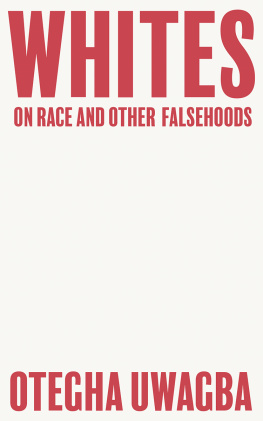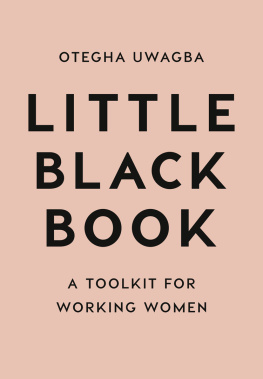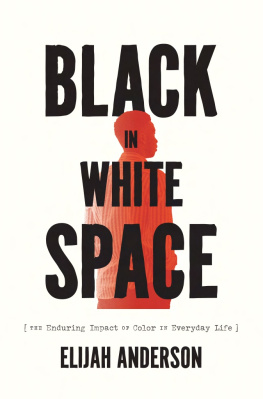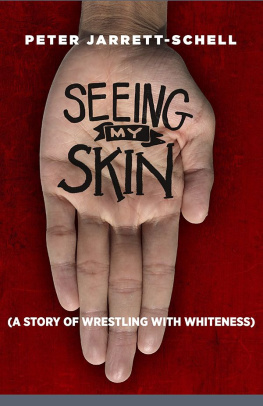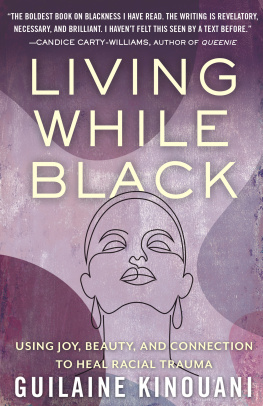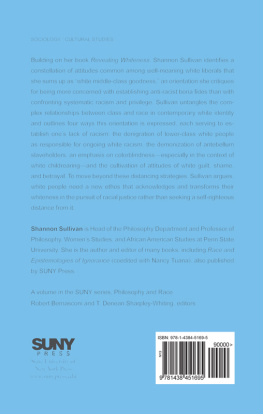Contents
Contents
Guide
WHITES
ON RACE AND OTHER FALSEHOODS
Otegha Uwagba

4th Estate
An imprint of HarperCollinsPublishers
1 London Bridge Street
London SE1 9GF
www.4thestate.co.uk
This eBook first published in Great Britain by 4th Estate in 2020
Copyright Otegha Uwagba 2020
Cover design: Ellie Game
Otegha Uwagba asserts the moral right to be identified as the author of this work
A catalogue record for this book is available from the British Library
All rights reserved under International and Pan-American Copyright Conventions. By payment of the required fees, you have been granted the non-exclusive, non-transferable right to access and read the text of this e-book on-screen. No part of this text may be reproduced, transmitted, down-loaded, decompiled, reverse engineered, or stored in or introduced into any information storage and retrieval system, in any form or by any means, whether electronic or mechanical, now known or hereinafter invented, without the express written permission of HarperCollins
Source ISBN: 9780008440428
Ebook Edition November 2020 ISBN: 9780008440435
Version: 2020-10-05
To know our whites is to understand the psychology of white people and the elasticity of whiteness. It is to be intimate with some white persons but to critically withhold faith in white people categorically.
Dr Tressie McMillan Cottom, Thick
This essay was written in the throes of an unthinkable summer, one where it seemed as though the entire world was teetering on the brink of collapse, and where I often imagined I could physically feel the shift from one era to another happening beneath my feet, could actually point at the fault line separating one period of time from the next and say, There. Thats where it happened.
And then, in the middle of that already strange season, George Floyd, a 46-year-old Black American man from Fayetteville, North Carolina, was killed by a white police officer a death that Floyds brother would later describe as a modern-day lynching and the world burst into flames.
The days and weeks that followed brought to a head countless tensions and unspoken grievances, at both the civic and personal levels, and it was the ripple effect of those events that prompted me to finally begin writing this essay. The thoughts that follow are largely constructed from notes I started making around five years ago: a collection of miscellaneous observations and emotions piling up day by day, lost memories abruptly making themselves known again and taking on new significance when arranged on a shelf alongside twenty others.
Sifting through them, a very clear unifying theme quickly became obvious: not just racism in a general sense which is what I had thought I was writing about but white people, and what is required to coexist with them if you yourself are not white. The colossal burden of that requirement.
Already, my first hurdle: I didnt particularly want to write an essay about being Black that placed white people at its centre. I felt still feel deeply confronted by that prospect, wary of falling into the easy trap of evaluating Black experiences solely in relation to whiteness. As I weighed this up, an interview with the New York-based artist Rashid Johnson caught my eye. Part of a larger feature focusing on contemporary Black artists actively resisting the expectation to create work catering to the white gaze (as is often the unspoken mandate in creative fields), Johnson noted that society consistently finds new ways to position the work of Black artists as inherently being in response to the obstacles presented by a white world. That was the very opposite of what I wanted to do produce something angled toward the white gaze, or write an essay that might become an emblem for progressive white people wanting to prove their credentials, wallowing in their guilt about the existence of a system that works to their advantage while doing nothing to divest from it.
All this to say that although I didnt want to write an essay where white people took centre stage, as youll discover, thats exactly what Ive done. This essay is very much a response to the obstacles presented by a white world. It became clear to me that to write about navigating racism and not place white people at the centre of that narrative would be to elide the very thing I was trying to write about, because navigating racism is really a matter of navigating white people.
Perhaps that conclusion seems obvious, but it took me a little while to get there, and to work through my competing desires about how to approach this essay. On reflection, that push and pull between what I wanted to do, and what racism necessarily requires of me seems strangely apt, a facsimile of whiteness itself and the way it compels, overrides, distorts, and ultimately controls.
I still havent watched George Floyd die.
Ive seen stills from that video embedded into news articles, and when Im scrolling through social media Ill occasionally stumble across a few seconds of his ordeal if a video clip unexpectedly begins to autoplay, but I havent watched the video that so many found themselves watching at the start of this summer. I havent watched a grown man undone by the knowledge of his impending death, pleading alternately for two life-giving forces, for his mother and for air. I havent witnessed the precise moment where he passes from living to dead, the last few dregs of life gurgling out of him, squeezed out beneath the heft of someone elses knee.
Mostly this is because I already made that mistake a few months earlier, with Ahmaud Arbery. Shocked by what Id read about his murder, but unable to wrap my head around the idea that such an egregiously violent act had somehow gone unpunished, I felt compelled to see it with my own eyes, even in my guilt at stripping this man of his last shred of dignity by gawping at the spectacle of his death. The video I found played itself on an endless loop, so I watched it again and again and again and again, committing every second to memory, trying to understand. His baggy white T-shirt, and loose running shorts. The off-screen tussle over a shotgun, and the sharp pop of gunfire before Arbery emerges back into frame, loping languidly across the street. At first it looks like he is breaking into a jog, about to resume his run, the situation resolved. But then a red stain blooms across his T-shirt and seconds later he collapses to the ground, limbs suddenly liquid. And then hes dead.
I watched that sordid video enough times, can picture it so clearly in my minds eye even all these months later, that I knew I didnt want to go through the same thing with George Floyd. I dont want to accept that hes dead, and that he died the way he did, so I keep skipping over that part of his story and the abject horror of those final eight minutes and forty-six seconds.
Ive watched other videos of him though, videos from when he was still alive. It feels trite to say it but thats how I feel he deserves to be remembered, how I want to remember him. A short snippet of him rapping (for a while Floyd was part of Houstons chopped and screwed music scene, performing under the name Big Floyd). Another video in which he is offering motivational life advice, hinting at his own past struggles and urging resilience in the face of adversity, announcing in his gloopy southern drawl, man, I love the world! The stories that have since emerged about his life from family and friends, and from his widowed fiance, confirm that yes, George Floyd certainly did love the world, even if ultimately it didnt love him back.

